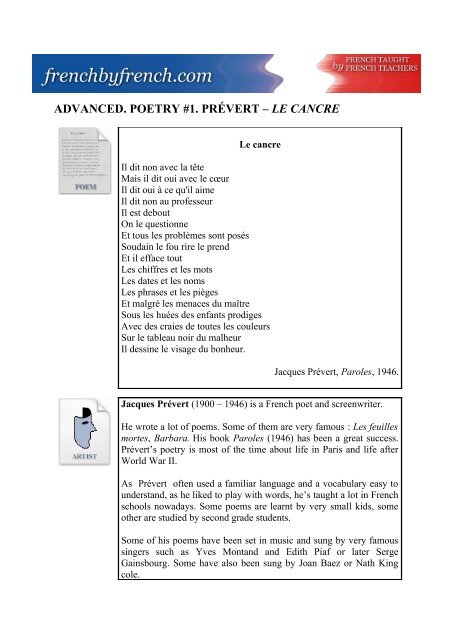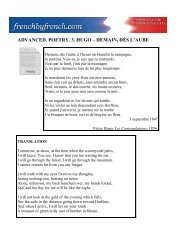Advanced - Le Cancre - Frenchbyfrench
Advanced - Le Cancre - Frenchbyfrench
Advanced - Le Cancre - Frenchbyfrench
Create successful ePaper yourself
Turn your PDF publications into a flip-book with our unique Google optimized e-Paper software.
ADVANCED. POETRY #1. PRÉVERT – LE CANCRE<br />
<strong>Le</strong> cancre<br />
Il dit non avec la tête<br />
Mais il dit oui avec le cœur<br />
Il dit oui à ce qu'il aime<br />
Il dit non au professeur<br />
Il est debout<br />
On le questionne<br />
Et tous les problèmes sont posés<br />
Soudain le fou rire le prend<br />
Et il efface tout<br />
<strong>Le</strong>s chiffres et les mots<br />
<strong>Le</strong>s dates et les noms<br />
<strong>Le</strong>s phrases et les pièges<br />
Et malgré les menaces du maître<br />
Sous les huées des enfants prodiges<br />
Avec des craies de toutes les couleurs<br />
Sur le tableau noir du malheur<br />
Il dessine le visage du bonheur.<br />
Jacques Prévert, Paroles, 1946.<br />
Jacques Prévert (1900 – 1946) is a French poet and screenwriter.<br />
He wrote a lot of poems. Some of them are very famous : <strong>Le</strong>s feuilles<br />
mortes, Barbara. His book Paroles (1946) has been a great success.<br />
Prévert’s poetry is most of the time about life in Paris and life after<br />
World War II.<br />
As Prévert often used a familiar language and a vocabulary easy to<br />
understand, as he liked to play with words, he’s taught a lot in French<br />
schools nowadays. Some poems are learnt by very small kids, some<br />
other are studied by second grade students.<br />
Some of his poems have been set in music and sung by very famous<br />
singers such as Yves Montand and Edith Piaf or later Serge<br />
Gainsbourg. Some have also been sung by Joan Baez or Nath King<br />
cole.
Prévert is also a famous screenwriter : he worked on very great films<br />
such as Quai des Brumes (Port of shadows, 1938), <strong>Le</strong>s Visiteurs du<br />
soir (The night Visitors, 1942), or <strong>Le</strong>s Enfants du Paradis (The<br />
Children of Paradise, 1945).<br />
Jacques Prévert wrote a lot of poems about life school and kids who<br />
work with strict and boring teachers and wish for liberty.<br />
<strong>Le</strong> <strong>Cancre</strong> is one of them. <strong>Cancre</strong> means « dunce ».<br />
This poem is about a little boy who is unhappy at school. He has to<br />
work, he has to learn but he doesn’t care, he’s not interested by all<br />
these sentences, these figures, these dates the teacher want him to<br />
learn. And he finally rebels.<br />
Cœur (masc.) : heart.<br />
Etre debout : to stand.<br />
Questionner : to question, to interrogate.<br />
Rire (masc.) : laugh.<br />
Rire : to laugh.<br />
Fou rire (masc.) : fit of laughter.<br />
Effacer : to erase.<br />
Chiffre (masc.) : figure, number.<br />
Date (fém.) : date.<br />
Phrase (fém.) : sentence.<br />
Piège (masc.) : trap.<br />
Menace (fém.) : threat.<br />
Menacer : to threaten.<br />
Huée (fém.) : boo.<br />
Huer : to boo.<br />
Prodige : prodigy.<br />
Craie (fém.) : chalk.<br />
Tableau (masc.) : blackboard.<br />
Malheur (masc.) : misfortune, unhappiness.
Bonheur (masc.) : happiness.<br />
Dessiner : to draw.<br />
This poem is about a little boy.<br />
On le questionne = on questionne le petit garçon.<br />
<strong>Le</strong> fou rire le prend = le fou rire prend le petit garçon.<br />
<strong>Le</strong> is here a direct object pronoun. It replaces a masculine noun.<br />
If this story was about about a little girl, we’d have : la.<br />
On la questionne. <strong>Le</strong> fou rire la prend.<br />
http://www.frenchbyfrench.com<br />
http://www.frenchbyfrench.com/advanced.php



